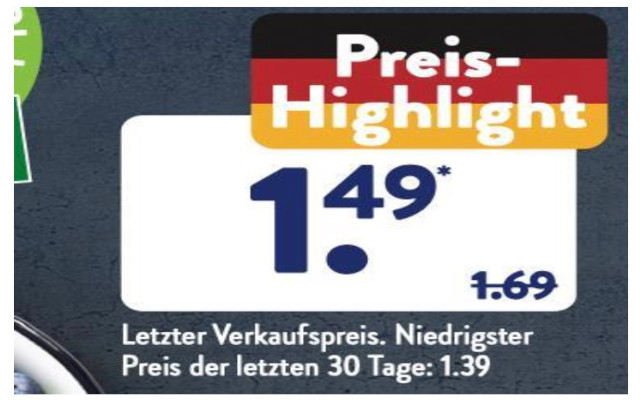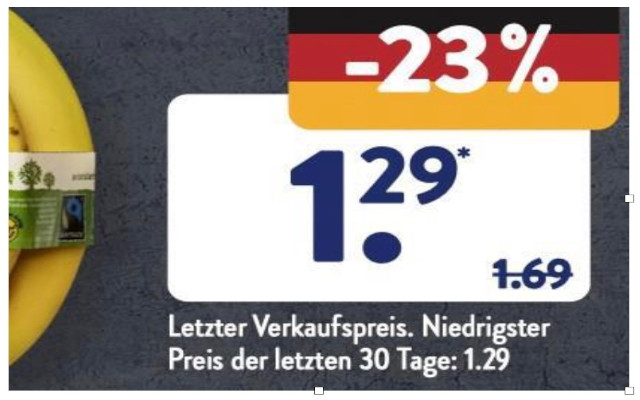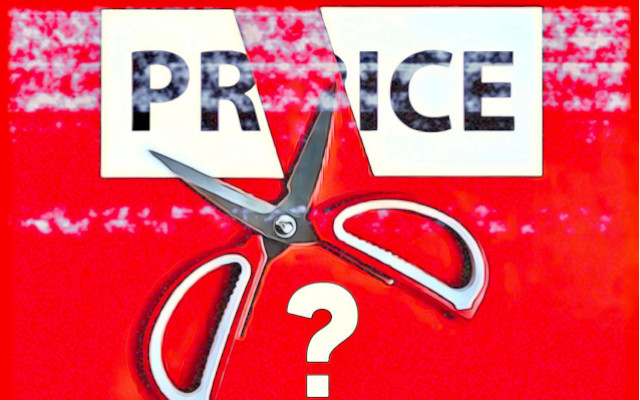The Court of Justice of the European Union has clarified the conditions for the legality of promotional offers in the EU, in the case brought by a consumer association from Baden-Württemberg (Germany) against Aldi Süd. (1)
The official interpretation given by the Luxembourg courts on 26 September 2024 in Case C-330/23 applies to any commercial sector subject to Directive 98/6/EC on the indication of the prices of consumer goods.
1) Price Indication Directive, preamble
Price Indication Directive 98/6/EC prescribes the indication of selling prices per unit and quantity, as well as per unit of measurement (i.e. €/kg, €/l), inclusive of VAT and other taxes (e.g. duties on alcoholic beverages), in relation to products placed on the market in the Union. This facilitates the comparison of prices of different products, and with the exception of bulk products for which only the unit price is indicated (2.3).
Both prices – subject to the exemptions set out below (see paragraph 1.1 below) – must always be indicated unambiguously, and be easily identifiable and legible, and also applied to product advertising (if it mentions the selling price). The unit price must not be indicated if it is identical with the selling price.
1.1 Exemptions
Only the unit price of the drained net weight may be indicated on pre-packed products where it is to be indicated in combination with the net weight. (4)
Member States may then decide to apply certain exemptions in relation to the following cases:
– indication of the unit price, on products where this is not useful because of their nature or purpose, or where it leads to confusion;
– application of both prices, on products supplied in connection with the provision of services, sales by auction, works of art and antiques.
2) Omnibus Directive, the reform
Omnibus Directive (EU) No 2019/2161 updated the consumer protection rules also with regard to price indications. It also introduced, as we have seen, a very strict penalty regime. (5)
Transparency on price reductions therefore requires, in the case of an announcement of promotional offers:
– the temporary price reduction by a trader must be based on the previous price; and
– the previous price shall be the lowest price charged during a period of not less than 30 days prior to the promotional offer (Omnibus Directive, Article 6a).
Member States may take different measures with regard to:
– goods that are liable to deteriorate or expire rapidly; (6)
– the establishment of a shorter period for the ‘previous price’ in relation to goods placed on the market for less than thirty days;
– the determination of the ‘previous price’ as the price without the reduction prior to the first application of this practice, if the promotional offer is subject to progressive increments. (7)
3) Promotional Offers, Commission Communication
The European Commission has adopted a Communication aimed at clarifying:
– the modalities of application of the reform mentioned in the previous paragraph (Omnibus Directive, Article 6a)
– the interaction with the Unfair Commercial Practices Directive 2005/29/EC, itself amended by the Omnibus Directive. (8)
3.1) ‘Price Reduction Announcement
Promotional offers (‘price reduction announcement’) can be communicated in different ways, of which the Commission offers some examples:
– price reduction announcement in percentage terms (e.g. ‘20% discount’) or absolute terms (e.g. ‘10 euro discount’);
– indication of a new (lower) price, next to the (higher) price previously applied. The previous price can be crossed out (e.g. ‘now 50 EUR (previously 100 EUR)’ or ‘50 EUR/100 EUR’);
– any other promotional message, e.g. ‘buy today and pay no VAT’ (to indicate that the price reduction is equal to the value of VAT);
– presentation of the current price as the ‘launch’ price, ‘instead of…’ the ordinary (higher) price to be charged later.
3.2) ‘Price’, sales and Black Friday, comparisons
The ‘price’ indicates the selling price, i.e. the price per unit of measurement of bulk products, which is determined at the stage of choosing the required quantity.
Black Fridays, ‘sales’, ‘special offers’ and similar promotional campaigns fall fully within the scope of these rules.
On the other hand, price reductions not linked to advertisements (but merely applied) are excluded, as are comparative advertisements insofar as they do not suggest price reductions (e.g. better/lower prices). (9)
4) Responsible operators
Responsible (professional) operators are all those who interface with consumers to sell products, including those who rely on intermediaries (i.e. online marketplaces) and operators based in third countries.
Conversely, excluded are:
– intermediaries who merely provide services for the sale of products, such as online marketplaces or price aggregators, unless they also sell their own or others’ products
– cash back announcements by third parties who have not sold the goods.
5) Indication of the previous price
The reference to the lowest price in the 30 days preceding the promotional offers – as a parameter for defining the ‘previous price’ – has the precise purpose of preventing traders from altering prices immediately before the application of ‘discounts’, the value of which is thus distorted.
Professionals using several sales channels, physical and/or online, must always refer to the ‘previous price’ applied in the individual channels where the promotional offers are announced.
The following are excluded
– loyalty programmes, vouchers or discount cards enabling customers to benefit from discounts for continuous and prolonged periods (i.e. one year), or to accumulate credits for further purchases, as well as
– personalised offers with dedicated vouchers (i.e. for subsequent purchases or on special days such as first registration, birthday), i.e. applied at the time of purchase and not previously announced.
6) Gradual Price Reduction
The gradual reduction in price during the same sales campaign must be carried out without interruption or discontinuity. An increase in price from that indicated during the overall reduction is therefore not tolerated.
Promotional sales campaigns organised over a 30-day period – either weekly or linked to close events (e.g. Christmas offers in November and December) – are themselves always subject to the ‘previous price’ rule.
7) Interaction with the Unfair Commercial Practices Directive
Unfair Commercial Practices Directive 2005/29/EC applies before, during and after any commercial activity by traders to consumers.
It should be noted that:
– specific rules, such as those on price reduction announcements, prevail over general rules (according to the principle of speciality, lex specialis derogat legi generali); and yet,
– promotional offers may themselves be qualified as unfair commercial practices, in application of the general criteria established for the protection of consumers (see paragraph 5.1 below);
– Directive 2005/29/EC also applies to the provision of services, the promotional offers of which may therefore be penalised under it.
7.1) Discounts and unfair commercial practices, some examples
Unfair commercial practices in the area of promotional offers may occur, for example, according to the European Commission, in cases of:
– excessively long ‘discount’ periods compared to the period in which the goods are sold at full price; so that the ‘discount’ only serves to attract consumers as opposed to the ordinary
– price-cutting advertisements announcing, for example, ‘discounts of up to 70%’, where only a small number of items are discounted by 70% and the discount applied to the others is significantly lower;
– comparisons with other prices, e.g. prices charged by other traders, or the manufacturer’s ‘recommended’ retail price, when they do not comply with the relevant rules; (10)
– combined offers and tied offers subject to conditions (e.g. ‘two for the price of one’, ‘30% discount on the purchase of three items’).
8) Promotional offers, the Aldi Süd case
The consumer association of the state of Baden-Württemberg (Verbraucherzentrale Baden-Württemberg eV) filed a lawsuit against the retail giant Aldi Süd with the Regional Court of Düsseldorf in connection with an advertising flyer that was circulated in the period from 17 to 22 October 2022.
Aldi Süd advertised promotional offers on various fresh fruit and vegetable products, including loose organic bananas and fair trade pineapples. However, consumers noted the falsity of the ‘previous prices’ indicated in the flyer, as the same products had already been offered at lower prices.
8.1) Preliminary questions
The German magistrates disagreed with the position of the consumers, but suspended the proceedings in order to refer the following questions to the Court of Justice of the European Union (CJEU) for a preliminary ruling
– must a discount percentage indicated in a price reduction advertisement refer only to the previous price referred to in Article 6a of the Omnibus Directive?
– must the price indicated for promotional purposes, in order to demonstrate the appropriateness of a promotional offer, always correspond to the ‘previous price’?


Fig. 1 – Price reduction announcement by Aldi Süd for bananas and pineapples, respectively (source: CJEU)
9) Court of Justice of the European Union, Judgment of 26 September 2024
Court of Justice of the European Union, in its judgment of 26 September 2024 (Case C-330/23), ruled that:
– although Article 6a of the Price Indication Directive, as amended by the Omnibus Directive, does not specify whether a price reduction contained in an advertisement must be calculated on the basis of the ‘previous price’ – the term ‘reduction’ must in any event refer to a reduction made in relation to the price previously charged.
9.1) EUCJ, the Grounds
The ultimate goal of the aforementioned regulation is in fact to ensure maximum consumer protection. The Commission’s communication and the comments made by several Member States converge in stating that the mere declaration of a previous price, without this being the actual basis for calculating the reduction, risks:
– undermine the objectives of the two directives, and
– facilitate practices such as price increases in a period immediately preceding the price reduction.
All promotional offers announced by traders, whether in the form of a percentage reduction or wording emphasising the advantage of the announced price, must therefore be determined on the basis of the previous price as defined in Article 6-bis, i.e. for a period of not less than 30 days prior to the price reduction.
10) Provisional conclusions
The diktat of the Court of Justice – whose interpretation has official value, i.e. binding for all member states and their administrations, including judicial ones – clearly defines the constraints to be respected in any commercial information where it refers to promotional offers and discounts on the sale of any kind of products in the European Union.
Member States will have to update, where appropriate, their legislation transposing the aforementioned directives, such as the Consumer Code in Italy. (11) And competent national authorities will have to carry out appropriate supervision, in physical markets as well as in e-commerce and online marketplaces. Also in order to counter unfair commercial practices associated with greedflation. (12)
Dario Dongo e Andrea Adelmo Della Penna
Footnote
(1) Judgment of the Court (Eighth Chamber) of 26 September 2024. Verbraucherzentrale Baden-Württemberg eV v Aldi Süd Dienstleistungs-SE & Co. OHG. Case C-330/23 https://tinyurl.com/mnxywh3d
(2) Directive 98/6/EC on consumer protection in the indication of the prices of products offered to consumers http://data.europa.eu/eli/dir/1998/6/oj
(3) See also the paragraph ‘Price indication, the current rules’ in the previous article by Dario Dongo, Marta Strinati. Everli, Carrefour, the ecommerce that deceives. High prices and misleading labels. GIFT (Great Italian Food Trade).
(4) Nominal quantity, net weight, drained weight, replies the lawyer. Dario Dongo. FARE (Food and Agriculture Requirements). 20.1.17
(5) Dario Dongo, Alessandra Mei. Unfair commercial practices, the Consumer Code in the digital age. GIFT (Great Italian Food Trade).
(6) Fresh foods and beverages may fall within this definition, which however requires a case-by-case assessment. In general, perishability must be due to the physical characteristics and properties of the object, and not be linked to commercial characteristics (e.g. seasonal clothing).
(7) For example, if the previous price of a first price reduction (-10%) is €100, this price can remain the same even in the case of subsequent continuous price reductions (-10% becomes -20%, and so on).
(8) Commission Notice – Guidance on the interpretation and application of Article 6a of Directive 98/6/EC on consumer protection in the indication of the prices of products offered to consumers (2021/C 526/02) https://tinyurl.com/yckakk9m
(9) Such practices are in any case subject to the discipline of unfair commercial practices.
(10) Directive 2006/114/EC concerning misleading and comparative advertising https://tinyurl.com/mtpsktd9
(11) Legislative Decree 206/2005 and subsequent amendments, Consumer Code. Consolidated text as of 30.12.23/XNUMX/XNUMX on Normattiva https://tinyurl.com/yy8s229p
(12) Dario Dongo. Greedflation and shrinkflation, survey in the UK. GIFT (Great Italian Food Trade).









